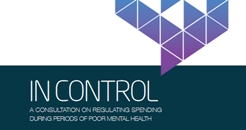 Money and mental health - a consultation
Money and mental health - a consultation
Money and Mental Health is a new charity established to break the link between financial difficulties and mental health problems. People with mental health problems are far more likely to face financial difficulty than others. In their June 2016 report, 'Money on Your Mind', they analysed the experiences of nearly 5,500 people with mental health problems to develop the first comprehensive map of the reasons why.
One of the significant pathways to emerge during this exercise, was the struggle faced by many people with mental health problems to control their spending when unwell. 93% of respondents told us that they have spent more during a period of poor mental health; 71% do so ‘always’ or ‘often’.
The vast majority of higher spending could be categorised by the term ‘crisis spending’. They define this as spending behaviour which:
-
Occurs during a period of poor mental health
-
Is motivated by emotional or psychological needs and processes, rather than material need, and
-
Causes some form of financial detriment - including debt, debt crisis, or savings depletion
Crisis spending may manifest itself in different ways or be driven by different psychological or emotional needs and impulses. Key warning signs are a large number of transactions in a short period of time and increased spending late at night.
The charity would like to see policies which empower consumers to better control their own behaviour and;.
-
Can be put in place during a period of good mental health by the individual, either alone or with the support of a carer/ trusted friend /adviser
-
Prevent or reduce the incidence of financially harmful behaviour during a period of poor mental health.
These will require the support of the finance, retail and health sectors in particular to be successful.
Money and Mental Health have launched a consultation on such policies which set out a series of questions to gather input on how solutions are as effective and achievable as possible.
A key consideration will be how “sticky” this framework is. There must be some barriers to the easy removal of restrictions a person has put on themselves, but if nudges are too permanent they could unduly limit an individual’s freedom.
Examples of such barriers are:
-
Double-confirmation by the user required to remove restrictions
-
Alerts to a third party when restrictions removed
-
Mandatory cooling off period before restrictions removed
-
Cognitive/mental capacity assessment before restrictions removed
-
Third party sign-off before restrictions removed
Consumers with mental health problems reported particular anxiety about their inability to regulate spending online. Consumers said they would like to be able to limit their accounts in the following ways:
-
Delayed processing of transactions made during the night, pending confirmation in the morning
-
Third party authorisation of large transactions
-
Monthly or weekly spending limits.
-
Be able to exclude themselves from securing credit altogether
-
Be able to exclude themselves from particular forms of credit such as payday loans or online credit applications
-
Have credit applications authorised by a trusted friend before they are processed
-
Have a trusted friend notified of credit applications and/or changes in their credit score.
The consultation paper sets out the issues and and approaches (health service, finance and retail) sector, in more detail and invites people with personal or professional experience to respond by October 2016 to some or all of the questions posed to an email given at the end of the paper.
Do not feel you have to address every question in order to respond. Feel free also to suggest other areas of enquiry Money and Mental Health should pursue to help tackle crisis spending.
If you have lived experience of mental health problems, or have cared for someone who does, please also join their panel of Experts by Experience to help shape their work.
See also my previous blog on Helping Financial Management
Retweet about this article:
Geoff Knott, 19/07/2016